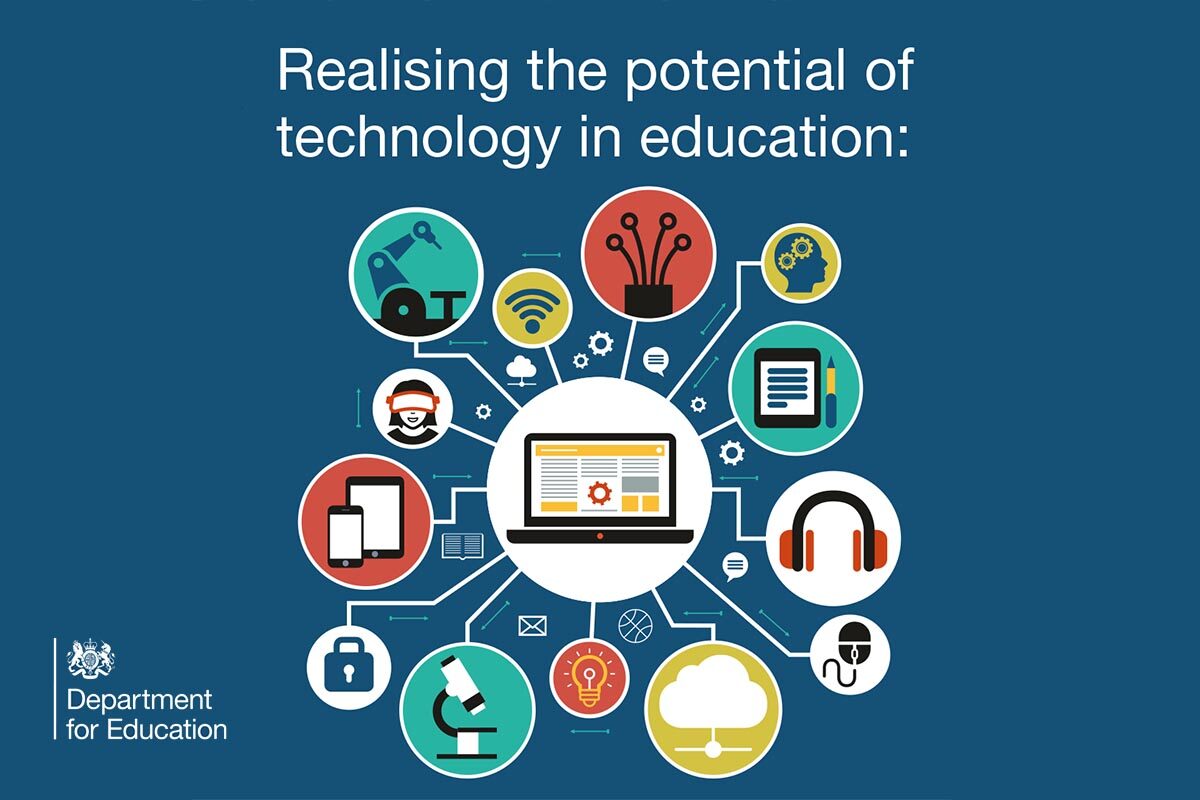£10 MILLION EdTech Strategy marks ‘new era’ for education – Sector response

The use of technology in education will be transformed by a new Government strategy published today (3 Apr) to reduce teacher workload, boost student outcomes and help level the playing field for those with special needs and disabilities.
Unveiling the Education Technology strategy at the Schools and Academies Show in London, the Education Secretary will set out plans – backed by £10 million – to support innovation and raise the bar in schools, colleges and universities across England.
Teachers, lecturers and education experts will unite with innovative businesses to harness the power of technology to tackle common challenges, and to ensure those working in education are equipped with the necessary skills and tools to meet the needs of schools, colleges, and their pupils.
EdTech exports are worth an estimated £170 million to the UK economy, and the strategy will deliver on the Government’s ambition for tech firms to work with the education sector and create innovative solutions to 10 key education challenges.

Five key areas of opportunity where technology can drive a step change:
- Administration processes – Reducing the burden of ‘non-teaching’ tasks, reduce teachers’ marking workload – using technology to cut the time teachers spend preparing and marking homework.
- Assessment processes – Making assessment more effective and effcient by identifying how anti-cheating software can be improved – setting out more detail on how the Government can help to tackle the problem of essay mills, particularly in universities.
- Teaching practices – supporting access, inclusion, and improved educational outcomes for all, promote the use of innovative tech to level the playing field for people with special educational needs and disabilities – identifying the technology that best suits individual needs.
- Continuing professional development – supporting teachers, lecturers and education leaders so they can develop more flexibly, boost training opportunities for teachers – looking at how technology can make training more accessible and tailored to individual needs of teachers.
- Learning throughout life – supporting decisions about work or further study and helping those who are not in the formal education system gain new skills.

Education Secretary Damian Hinds will say:
“We are living in a digital world with technology transforming the way we live our lives – both at home and in the workplace. But we must never think about technology for its own sake. Technology is an enabler and an enhancer. For too long in education, technology has been seen as something that adds to a teacher’s workload rather than helps to ease.
“This strategy is just the first step in making sure the education sector is able to take advantage of all of the opportunities available through EdTech. We now call on schools, businesses and technology developers to realise the huge potential of technology to transform our schools so that teachers have the time to focus on teaching, their own professional development, and – crucially – are able to cater to the needs of every single one of their pupils.”
For some children, technology can have a profound effect in opening up channels of communication – making learning accessible in ways not possible without the intervention of technology. Technology has the power to bring children with certain special education needs new independence in learning and communicating.
So as part of the strategy, the Education Secretary will announce that leading assistive technology developers and education experts will make recommendations to the Government on ways to harness the power of technology to support learners with conditions such as dyslexia or autistic spectrum disorders to thrive in the classroom.
Overseeing work on the wider EdTech agenda, a new EdTech Leadership Group will be convened to bring together educators within industry and will report back by the end of the year. The Group will make commitments to determine future use of technology and practice throughout the education sector.
Government will also work in partnership with the UK’s innovation foundation Nesta, to find technological solutions on essay marking, formative assessment, parental engagement and timetabling technology – four of the ten EdTech challenges set out in the plan.
The collaboration will stimulate industry interest, and support the development of products, to ensure that they meet the needs of teachers, lecturers, pupils and students.
Working with the British Education Suppliers Association (BESA), schools will also receive help to identify the right products when buying technology through LendED, a free service which enables schools to try educational software before they buy them.
This platform will help to ensure that schools and colleges are getting the best value from the hundreds of millions spent every year on digital technology, to ultimately improve student outcomes, reduce teacher workload and help schools save money.
Sector Response
Minister for Universities, Science, Research and Innovation Chris Skidmore said:
“As the way we interact with technology is changing at an ever-increasing rate, it is more important than ever that the education system keeps pace with the change around us. We need to work with leading head teachers, education experts and tech companies to unlock the benefits for our children and young people.
“The collaboration enabled by this strategy will provide an unprecedented boost to the role technology has to play in schools, colleges and universities, and support the UK’s dynamic EdTech sector to develop an ever-wider range of exciting products and technology solutions.”
Drawing on existing expertise in the system, the strategy will also launch a series of ‘demonstrator schools and colleges’, which will showcase best practice and provide peer-to-peer support and training for teachers, lecturers and school leaders.
This will be supported by free online training courses for teachers and school leaders, produced by the Chartered College of Teaching, which will provide access to high-quality continued professional development and equip them with the knowledge required to make the best use of technology.
Head of Education Europe at Google Liz Sproat said:
“The strategy published today takes an important stance in supporting schools, colleges and universities to invest in technology, not only for the benefit of educators, but for their students too.
“From our work across Europe we are seeing how schools are embracing technology with impressive results. These positive developments come as a result of coupling technology with investment in professional growth, equipping educators with the knowledge they need to use technology effectively.
“It is encouraging to see how the DfE is pledging to support schools, not just with investment, but guidance on infrastructure and teacher skills to assist them in taking full advantage of the exciting array of technologies on offer”.
Director of Education at Nesta Joysy John said:
“We welcome the launch of the Department for Education’s new EdTech Strategy, which will bring much needed coordination to the field. Part of the Government’s new EdTech Fund will be supported by Nesta to bring together schools and the tech industry, building an evidence base and supporting the EdTech products that really work.
“Schools and colleges will be involved every step of the way in product development and implementation, and we believe this is a crucial step in creating a smarter system that benefits both teachers and students.”
Director of Corporate Strategy at Ofsted, Chris Jones, said:
“The Government’s EdTech strategy highlights some exciting opportunities for teachers to harness technology that allows them to dedicate their energies to the substance of education: effective teaching of the curriculum that produces great outcomes for pupils.”
UK Director of Education for Microsoft, Chris Rothwell, said:
“Technology is having incredible impact in all aspects of education today, but there is always more to be done. We welcome the announcement of an EdTech strategy for England, with its focus on building on existing best practice and lowering barriers to adoption for all.”
Julian Gravatt, Deputy Chief Executive, Association of Colleges, said:
“Colleges have always been at the forefront of using technology in education and training and in helping people to acquire technological-related skills. To some extent, the education sector has been behind others in applying technology to its core activities. This needs to be a priority in the 2020s.
“College leaders look forward to working with DfE and others to make this happen both in the development of new initiatives like Institutes of Technology, T-levels and the National Retraining Scheme but also in improving the quality and relevance of education for millions of young people and adults.”
BESA Director General, Caroline Wright, said:
“It is deeply worrying that in 2019 too many teachers are still apprehensive of using technology as a teaching aid. They may fear the humiliation of attempting to use digital devices in front of technologically tooled-up students because of an aging and antiquated school network infrastructure, or, most often in my experience, they simply don’t dare to go digital because they just don’t know where to start or who to ask for help.
“Today’s announcement by the Secretary of State for Education, Damian Hinds, is a welcome move to help schools’ better use technology to support teaching and learning outcomes.
“The DfE’s work partnering with key teaching and industry bodies to focus on practical school-led solutions, showcasing best-practice uses of technology in schools, and teacher tech training in peer-to-peer groups will help raise both the confidence and competence of the teaching workforce.
“In my role at BESA, I have the honour of working with hundreds of incredibly vibrant EdTech companies, both large and small, who are working to innovate and transform the digital education learning environment for pupils and young people across the UK and across the world. EdTech is a fast-growing sector and I have the pleasure of accompanying an ever increasing number of UK companies, more than 200 UK EdTech companies last year, at leading education events around the globe providing technology-led solutions to support schools and Ministries of Education internationally. It is therefore vital that our own Government supports the continued growth and development of this exciting future-focused industry.”
Stephen Duignan, Vice President of International Marketing at LogMeIn, said:
“It’s great to see today’s EdTech strategy from the Department of Education, striving to put in place the technology to enable modernised learning. As higher education becomes increasingly connected and required remotely ever more often, both teachers and students must be empowered with the right technology to support today’s needs.
“This is especially true when it comes to managing student expectations, who are used to connecting when they need to, where they need to. What’s more, technology offerings are now playing a key role in the path students choose to take when it comes to higher education, meaning institutions need to sit up and listen.
“Thankfully, there are various technology solutions available to ensure a seamless education journey. Several new innovative tools such as collaboration and unified communications are now extending the learning experience significantly whilst also supporting teachers.
“A part of this is creating a trusted single place for learning – a place where students and teachers alike can go for products and services to aid their education. Indeed, the need for this was advised earlier this year by the Department of Education itself. Again, this can be carried out through unified communications technology – collaboration platforms can enable instant messaging, file sharing, on-demand video conferencing, transcription of the audio conversation and screensharing to ensure students can always flourish, even on-the-go.
“Learning technology has come a long way, and already significantly impacted the education industry. Those institutions which use this innovative technology to take communication beyond the classroom will be those that will not only draw in talented teachers and students, but also those which will enable them to be the best they can be.”
Helen Milner OBE, Chief Executive of Good Things Foundation – a social change charity, helping people to improve their lives through digital, said:
“Good Things Foundation knows from our work with 5,000 Online Centres across the UK that having digital skills can help people participate more fully in society and improve their lives through digital. That it is why we welcome the Government’s Education Technology Strategy published today. We are pleased to see that “learning throughout life” is one of the five key areas of opportunity in the strategy where technology can drive a step change. Digital exclusion in the UK is holding back economic growth and stalling social inclusion. The UK can benefit by £21.9 billion by upskilling the entire population in digital skills.
“We’ve helped over 2.5 million people improve their digital skills since 2010. 62% of unemployed learners progress on to employment related activities after engaging with us, as well as realising many other positive benefits. That’s why we are calling for all political parties to set a bold ambition and agree a goal of a 100% digitally included nation by 2028. Our research shows that a government which commits to this will see a benefit to the UK economy of £13 for every £1 spent – offering a net present value of £21.9 billion. It is time for Britain to take the lead and for Government and all political parties to commit to take action to make Britain a digitally inclusive nation.”
Elliot Gowans, Senior Vice President, International at D2L, made the following comments:
“This strategy is a very welcome shift in thinking about the investment in and prioritisation of technology in the classroom. Modern learners now expect greater technology-enabled learning options, such as access to learning materials on their smartphones and tablets. However, for too long new technology has been implemented in education without the institutional support required to equip teachers and lecturers with the necessary skills to use them to their utmost – as Mr Hinds rightly points out, in the past, technology has often become a burden rather than a benefit for teachers. With these shifting paradigms, lecturers, tutors and other members of teaching staff must continually refresh their knowledge and skills to stay informed on the technology systems, platforms and applications in use. That’s why I am so pleased to see emphasis placed on supporting teachers in their own Continuing Professional Development (CPD) within this new strategy. Ongoing learning is a critical part of a career in education, and institutions that support staff through simple, effective tech-based development programmes stand to increase staff engagement and improve teaching standards overall.
“With CPD at its core, teachers and students will be able to take full advantage of the education technology now available. Technology, previously seen as a burden by those teachers insufficiently trained to use it, will now make their working lives easier, helping to promote a transition from a static, one-way teaching model where the teacher instructs a group of students with the same materials at the same pace, to one that is much more interactive and dynamic. To continue on this trajectory and deliver the best possible learning experience, education providers must have access to technology to shape the education journey and reach every learner – something that many teachers haven’t been able to do before. The proposed greater collaboration between Government, industry and educational institutions will ensure that educators are getting the most suitable technology for their specific needs, and the support and training they need to use it.
“In his statement, Mr Hinds also touches on how digitalised learning can completely change the experience of those students who require greater accessibility assistance, which is extremely important. These specific accessibility requirements can be met through edtech features such as speech-to-text and text-to-speech, which will allow teachers to create pedagogically sound courses so that students can concentrate on their studies without needing to make adjustments themselves.”
Andy Goff, Director of ONVU Learning, said:
“The announcement of the new £10m EdTech strategy shows a pattern shift in the way that the government is thinking about the education system. The focussed implementation of education technology can work to the advantage of schools when focused on teacher training and development to improve learning outcomes.
“ONVU Learning’s work with Aston University Engineering Academy, who have implemented cutting-edge 360-degree cameras in a bid to allow teachers to observe their own performance and gain more consistent learnings from their classroom to self-improve. It is this prior experience with technology applied for the benefit of, and under the control of classroom teachers, in an empathetic way, that we are delighted to see in the direction which Damian Hinds’ directive has outlined in this EdTech strategy, in particular the concentration on improving training and development for teachers. This is vital for the revival of the profession.”
Simon Wilde, MD, Education at Civica, said:
“We support the Department for Education’s recently launched edtech strategy, including the £10 million fund to help develop technology to address key challenges facing the education sector. During a week where more than 1,000 councillors in England have written to the education secretary urging the government to give schools extra funding, the need for technology which helps schools run more efficiently and make better informed financial decisions has never been higher.
“A report last year by the Institute for Fiscal Studies showed that total spending per pupil in England had fallen by 8% in real terms between 2009-10 and 2017-18. Modern cloud-based technologies are designed to cut costs and improve productivity and should be seen as a necessity to overcome the current challenges that institutions are facing. By simplifying and speeding up back office processes through better automation schools can spend less time on administrative tasks and more time supporting students, teachers and parents. Using data more effectively will also enable schools to make more effective financial decisions.
“We’re hopeful that this new edtech strategy will bring education and technology providers closer together to drive better outcomes across the education system. Businesses can work alongside education experts to both help schools properly adopt new systems and develop the technologies which the education system will need for the future.”
The launch of the EdTech strategy is the latest step taken to reduce the burden on teachers and schools, including the launch of the Teacher Vacancy Service, which has now been rolled out nationwide. This will help schools bear down on the estimated £75m spent on recruitment advertising per year, providing a simple, free and easy-to-use platform for teachers to find their next career move.
The UK’s innovative EdTech businesses are integral to the success of the strategy, and through the modern Industrial Strategy we are supporting these businesses to start, scale and grow, placing the UK at the forefront in the development and adoption of new technologies.
The new EdTech Strategy will go further by ensuring businesses are better equipped to develop products which meet the needs of educators, enabling them to build a robust evidence base to demonstrate the impact of their products; and driving demand for both innovative and proven products.











Responses